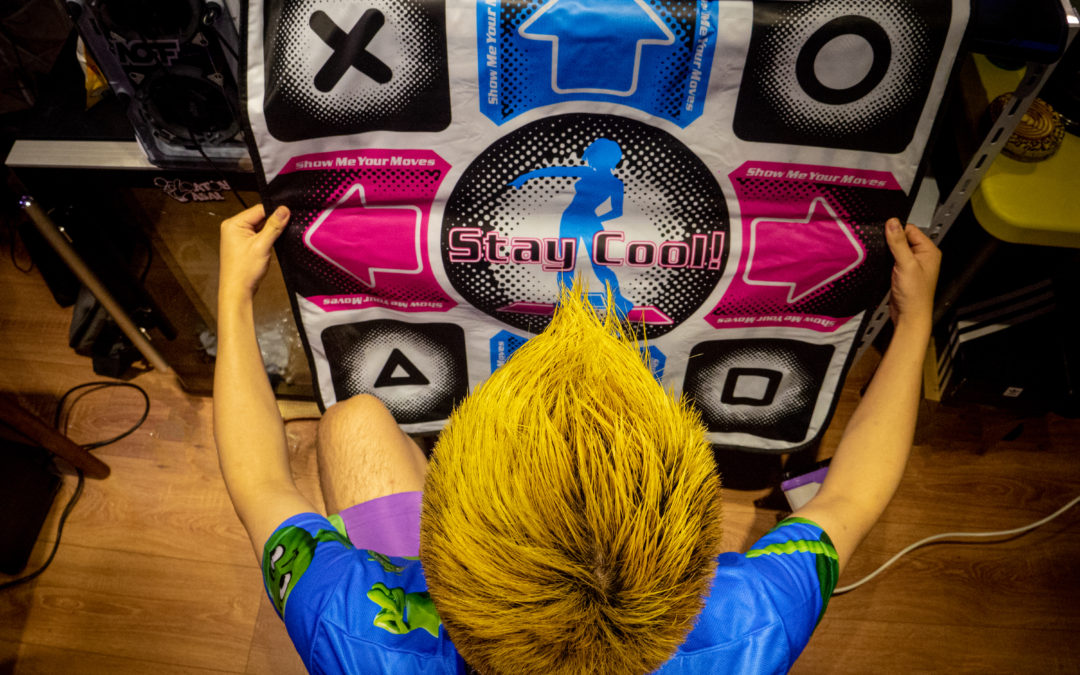Shanghai-based musician Gao Jiafeng is a bit of a chameleon when it comes to his place in the music scene here in China. Self-described in the past as a ‘karaoke/alternative pop/comedy project’ Jiafeng has all the makings of a viral star – throwing out an irreverent saxophone solo at will and stitching together retro-fitted music videos that often come across like something you’d find at you’re auntie’s KTV parlour. But always lurking underneath his guise is a multi-talented musician on the cusp of breaking through into the mainstream. Jiafeng’s chops as a producer and singer are in top form on his latest endeavour – 《Emotional Dance Music》 – a hybrid game/music release that mixes dynamic ‘Hyper Pop, sugar-coated dance music, lighting speed Trance-Pop’ and then some with the frantic competitive game aesthetics of DDR (Dance Dance Revolution) for a unique multi-media experience that’s unlike anything else. We talked with the madcap trailblazing artist in his studio about how the release and concept came together.

Could you explain the meaning behind the name of the album – specifically how you view ‘幻爱’ and the term ‘emotional dance music’?
“Hallucinatory love” is the best word I can think of – I want to describe a perfect state of love – magnified by soft light and trailing stars – eternal love, the spinning love in the memes, love without irony. The love that human boys and girls want but can not find . “Emotional” is talking about the sweetness and disappointment associated with this kind of love, and accompanied by the beat of the dance music, one can immersed themselves in on the dance floor.


Millennials and the first generation netizen are often described as melancholy bereavement filled with helplessness and illusory feelings, do these feelings manifest themselves in your own daily life?
They didn’t, I’ve been sensible this millennium so far. My childhood was a college town road full of magnolias leading to a school blackboard updated every day with a new poem – as well as Zheng Yuanjie’s King of Fairy Tales (童话大王) and campus folk singer Lao Lang. Perhaps because my childhood was full of literature it’s now not so easy to feel the emptiness? (it’s also has made it difficult to read now?). My daily life is always full of work – I finished two other interviews before this one, full asleep afterwards, and then woke up and continue video editing – no time for emptiness.


You mention that this project started as a joke. But clearly, based on the care you put into your work, you hold the music you create dearly. When does it cease to be a joke for you or do you find it important to walk the thin line between parody and pop music? Between performance artist and secret pop star? Or do those lines just blur eventually?
The title is a kind of a joke, but you are right – the rest of work I put into the album are real AF. The thin line that you mentioned does exist, it sits between being a participant and a self-observer. So far, I found this career is like a life-long immersive cosplay, which I am OK to quit at any second, but I’m too curious to see how far I could go.

The song “Cuteness is Useless” with Yangji itself is a cute song, but the lyrics “the girl who has most love memes in her phone, doesn’t really have love in her heart ” sounds rather helpless. Is there a true story behind the song, or what personal emotions are in it?
You’re right, it does come from real life, but it’s not about specific things. It’s a collection of people you know/things you’ve been through. Many people will put love emoji on their photos, they also can move their fingers in one second to send love memes to a phone chat, but our ability to love and be good to people has really degraded, which makes those emojis look unusually hollow; like a monument; r like a museum exhibit; like a kind of memorial.
What memories do you have of DDR? What was so unique about it when you were growing up? Were you looking to tap into something similar when you came up with your hacked version of the game?
My parents bought an DDR game (probably a fake one tho) around when I was 12 and I had so much fun. I was pretty bad at the game to be honest. When I made my own game, I tried to imagine myself as both beginner and pro, to make sure it’s friendly to all kinds of players out there. Another thing that impressed me deeply was the music in the early DDR games. Most of the songs were fast Eurodance tracks and I found this kind of music quite exciting. When I made this album, I had all those retro yet circa-2000s futuristic sounds playing in my head, meanwhile I managed to mix them with some contemporary 2020’s sounds and styles. I think the final result is a good balance between the two.


What was the chance to make the final decision to create a DDR game for the album?
Konami’s DDR was one of the inspirations for the album, but it’s a commercial game that can’t be easily hacked. One night I was looking for inspiration for the album’s design, and I’d been searching for DDR’s previous game visuals, coincidently found StepMania as an open source software, which is not only a fully functional DDR simulator, but also allows users to edit and share their own designed music. At that time, I imported a song into that software, designed some arrows to try them out, and found it fit quite well. Then I decided to make the entire album into StepMania’s game pack.
Alright, here’s a brief how-to, in case anyone want to do the same
1) Download StepMania (freeware / opensource)
2) Drag your own songs to StepMania’s folder
3) Go to StepMania’s edit/share mode, set the right BPM. The software will generate beats/bars automatically according to the BPM.
4) Start making arrows! You should always try with your feet to make sure what you did is danceable.
These are the software part. I find them quite easy. Most challenging part is branding, package designing advertising and delivering, while advertising is the most difficult part among them all.


You graduated from a well-known music academy in the US, also have dabbled in some experimental music, but these recent years you’ve become a very representative Y2K internet singer. This change is quite significant – may I ask whether you have experienced some kind of “epiphany” ? Share this transformation with us!
Hahahaha, I graduated from a famous school, but I studied music engineering, which has nothing to do with creating music. I’ve always thought experimental music and pop music are so different and so far away from each other but in fact there’s only one piece of paper between the two. In the process of making experimental music, I felt a bit self-defeated – it led me further and further away from the music I love. I don’t think it’s right, and I wanted to establish a natural communication with the audience rather than feel a thousand miles away from them. To this end, I also made a picture (figure: the gap between communication). Eventually I found that in all the music genres I loved, the pop music that I’ve been despised was actually the best direction for me. Even if most people think my music is superficial, I don’t have too much to complain about.

Your music is constantly evolving with both your musical curiosities and the musical trends that young generations are locking into today – but this might be the closest you’ve gotten to creating something that unites all your tastes and fanbases- was it inevitable you would reach this point in your career?
Indeed, all the fields I stepped into are what I’ve been interested in. I never wanted to make any single kind of music for a whole life. That is to say, keeping myself transforming is definitely a big part of my music career. Another one of my main drives in creating music is wanting to bring more people together – from different music circles (e.g. hip hop, pop, underground club, punk), identities (e.g. LGBTQ and the rest) and social status, – so that there is a chance they might start to know and (hopefully) understand each other. In a word, keeping a stable 人设 sounds …not only boring, also less meaningful to me.

How has this outbreak affected your creation and recent career? Also I know that you are actually a fully aware person, do you think in China, as a musician or artist, can find their own path to participate in social issues?
The epidemic really made me patient in making sure this album was as good as it can be – it was the first time that I’ve created so much around a single core and theme, I feel a little sense of achievement hahaha. On social issues, everyone’s position is different. I think first of all , we need to be clear in one’s heart what is “justice”, and then in the process of your expression of justice, to find the “most effective and powerful” expression. A simple line of ‘cào nǐ mā’ – anyone can say that – but it is not constructive at all. My music now looks more and more simple on the surface compared to the experimental music I made a few years ago, and there is no shortage of criticism of me for being vulgar. But I’m sure if you listen carefully, there will be some discovery and new experiences. A few days ago a teacher tweeted on weibo that I was a “punk with the times” and I was really moved when I saw that.

